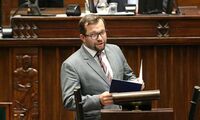Pândi Procescu: Difference between revisions
Caradia Gov (talk | contribs) Created page with "{{Person |title = His Excellency |image = Pândi Procescu.jpeg |position = President of Nova Caradia |tenure = 1690 - |born = 1658 |birthplace = Relacul, Caradia |pol..." |
mNo edit summary |
||
| (2 intermediate revisions by one other user not shown) | |||
| Line 1: | Line 1: | ||
{{Nova Caradia article}} | |||
{{Person | {{Person | ||
|title = His Excellency | |title = His Excellency | ||
| Line 22: | Line 23: | ||
In 1676, Pândi finished his training and was formally stationed with the Caradian armada in Relacul. He did not see any combat until the outbreak of the [[Caradian Civil War]] in 1680, fighting to defend the capital against revolutionary forces until rebel troops instigated the so-called "dark years" which resulted in the dissolution of Caradia. Pândi had the following to say about the experience: | In 1676, Pândi finished his training and was formally stationed with the Caradian armada in Relacul. He did not see any combat until the outbreak of the [[Caradian Civil War]] in 1680, fighting to defend the capital against revolutionary forces until rebel troops instigated the so-called "dark years" which resulted in the dissolution of Caradia. Pândi had the following to say about the experience: | ||
{{quote|I have little to say about that time, as | {{quote|I have little to say about that time, as we already all know of its horrors. All I remember is several years of cold, pain, and blood in the ice cap before I was fortunately located by a group of civilians who had hijacked a patrol boat and were fleeing to Eura. I joined them.|President Pândi Procescu}} | ||
[[File:Pândi Constitutional Council.jpg|left|thumb|200px|Pândi Procescu presiding over the 1689 constitutional council]]Pândi was quickly recognised in the proto form of [[Mina Mițura]] for his leadership capability, and attempted multiple times to form a provisional democratic government for the refugee settlement, though each time it was dissolved due to unrest amongst the populace. However, when King-Saint Godrîc XI was located in Eura, he was able to form a more lasting committee to organise a missive to the king. Pândi hoped that the presence of the king would quell unrest in the settlement and allow him to restore order. His government continued to operate mostly successfully until Godrîc (now Nicolae I) ordered the creation of the constitutional council. Pândi was appointed head of the council, and was instrumental in the drafting of the document. He was also successful in keeping order throughout the settlement by means of laws delivered on behalf of the king. | [[File:Pândi Constitutional Council.jpg|left|thumb|200px|Pândi Procescu presiding over the 1689 constitutional council]]Pândi was quickly recognised in the proto form of [[Mina Mițura]] for his leadership capability, and attempted multiple times to form a provisional democratic government for the refugee settlement, though each time it was dissolved due to unrest amongst the populace. However, when King-Saint Godrîc XI was located in Eura, he was able to form a more lasting committee to organise a missive to the king. Pândi hoped that the presence of the king would quell unrest in the settlement and allow him to restore order. His government continued to operate mostly successfully until Godrîc (now Nicolae I) ordered the creation of the constitutional council. Pândi was appointed head of the council, and was instrumental in the drafting of the document. He was also successful in keeping order throughout the settlement by means of laws delivered on behalf of the king. | ||
| Line 29: | Line 30: | ||
[[Category:Nova Caradia]] | [[Category:Nova Caradia]] | ||
[[Category: | [[Category:people]] | ||
Latest revision as of 21:55, 15 May 2023
 |
|
Tenure: 1690 -
Biographical Information Born: 1658 |
Iohan Procescu, who prefers to go by his middle name, Pândi, is a former Caradian soldier and first President of the Republic of Nova Caradia. He was also one of the founding fathers of the republic, as he was the head of the constitutional council that drafted the 1689 constitution of the republic.
Biography
Pândi was born in Relacul in the Duchy of Caradia in 1658 to a poor family that lived on the outskirts of town. He has stated that he believes that his willingness to accept democracy as a valid form of government over the totalitarian monarchy that had been exhibited by the Duchy began in his childhood household, as his family's financial situation and subsequent invisibility to the Caradian authorities led to many instances during Pândi's childhood of his parents committing private seditious crime, cursing the royal family and explaining repeatedly to Pândi the importance of personal freedom, a concept foreign to most Caradians at the time. As Pândi reached adolescence, his parents found work on a state farm in the countryside on which they eventually made a mistake and committed sedition in public, and were therefore reported to the authorities and sent to labour camps. As an orphan, Pândi was taken to train to become a member of the Caradian armed forces.
In 1676, Pândi finished his training and was formally stationed with the Caradian armada in Relacul. He did not see any combat until the outbreak of the Caradian Civil War in 1680, fighting to defend the capital against revolutionary forces until rebel troops instigated the so-called "dark years" which resulted in the dissolution of Caradia. Pândi had the following to say about the experience:
I have little to say about that time, as we already all know of its horrors. All I remember is several years of cold, pain, and blood in the ice cap before I was fortunately located by a group of civilians who had hijacked a patrol boat and were fleeing to Eura. I joined them.—President Pândi Procescu

Pândi was quickly recognised in the proto form of Mina Mițura for his leadership capability, and attempted multiple times to form a provisional democratic government for the refugee settlement, though each time it was dissolved due to unrest amongst the populace. However, when King-Saint Godrîc XI was located in Eura, he was able to form a more lasting committee to organise a missive to the king. Pândi hoped that the presence of the king would quell unrest in the settlement and allow him to restore order. His government continued to operate mostly successfully until Godrîc (now Nicolae I) ordered the creation of the constitutional council. Pândi was appointed head of the council, and was instrumental in the drafting of the document. He was also successful in keeping order throughout the settlement by means of laws delivered on behalf of the king.

Following the signing of the constitution, the offices of authority which were vacant were immediately vied for among the constitutional council members and other charismatic members of the public. Pândi was no exception to this, though he aimed his sights on the Presidency. He formed the Unită Caradia party, which reflected his centrist beliefs and his current vision for the nation of ensuring its own stability in the immediate future. In the elections of 1690, Pândi barely beat out rival candidate Ștefan Stănescu of the Alianță Liberală, who would go on to be the leader of the opposition of the Casa Legii. Pândi would then take his oath of office in the Curtea de Rozmarin in Rorfast, becoming the first President of the republic.
